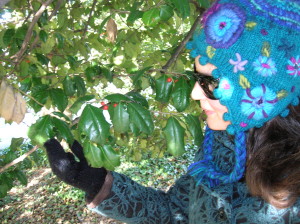
Playing my cello… in Central Park!!!!!!!!!!!!!
So in April and May I was taking a special acting class in New York.
Towards the end, my acting teacher encouraged me to start playing my cello on the street in New York City to help me become WAY more comfortable with playing in front of other people.
And part of me was like…WHAT??? This sounds
a) insane
and
b) terrifying!!!!!!!!!!
And then this weekend, I decided to try it. I put on an awesome outfit with crowns and feathers in my hair and took the subway to a super special spot in Central Park with great acoustics and beautiful mosaics, and I played from my heart.
And people stopped and listened … and it was so much fun!!! And I think this is just the beginning…

Victoriously holding my cello over my head after performing in the beautiful tunnel!
I can tell you right now, this NEVER would have happened without having my acting teacher mentor. The idea never would have even crossed my mind. I would still be thinking that playing out on the street was insane and terrifying, instead of having the experience of going to a beautiful place and then an audience just shows up and we have fun together!
So does having a mentor, a teacher, or a tutor, mean that you’re a loser?
This is something I’ve really been thinking about a lot.
I hear this all the time. Parents will tell me, “I don’t want to take my kid to a tutoring center because they’re worried someone will see them and then they’ll feel embarrassed/ashamed/humiliated…” Or even, “My kid isn’t allowed to have a tutor if they’re taking an honors class…”
And I’m like, WHAT?????????????
It’s like…every single athlete playing in the world cup… did they get there just by showing up to soccer practice? No frikkin’ way!! They had personal trainers, massage therapists, sports kinesiologists, and it wasn’t because they were “losers” or “not talented” or “just not a football/soccer person”… because they were committed to their own growth and their own vision and they knew they would get there way faster with support.
For some reason in our culture, we understand that if you get support with sports, it’s because you are committed to becoming stronger, faster, more flexible. We see that kid with a personal trainer or a private quarterback coach and think, wow, they are REALLY into it! But somehow there’s this like unspoken assumption that if someone has a tutor in academics, it’s because they are “not smart” or “a bad student” or even “a loser.”
WHY do we think like this?
The first time I ever heard of someone having a professional tutor, I was in high school. One of my classmates in my (notoriously challenging and amazing) high school history class mentioned that our teacher had encouraged him to get a professional tutor to help him with his essays for her class.
And by the way, his tutor spoke five languages and thought in Chinese (even though it wasn’t his first language).
I thought, wow, that sounds really cool!!!!!! My classmate got to hang out with a super interesting and unique adult who was mentoring him so he could master the skill of writing history essays.
It was just about receiving support from someone farther along the path in developing a very specific and valuable skill that happened to be challenging for him at that particular point in his journey.
I was almost jealous, and definitely intrigued!
I was not like, “OH, this kid is a LOSER!”
So why do people think that if they have a tutor, it will make them a loser?
I think it all comes down to three subconscious misunderstandings about how true mastery works:
Subconscious misunderstanding one:
“You either have it or you don’t.” (This is also known as “fixed mindset” – however much intelligence or ability you’ve got, that’s how much you have, and it’s never going to change.) In this case, for example, being tutored means that you “don’t have it”.
Subconscious misunderstanding two:
“Support doesn’t create true mastery.” This can also look like, tutoring is just about getting by, getting through it, scraping by, and surviving by the seat of your pants.
Subconscious misunderstanding three:
“You get to the top on your own.” So if you’re getting support, then you’re not one of those ‘special people’ who ‘got to the top’ working in isolation.
Fortunately, these are all actually just misunderstandings, and they are not true. (Phew!)
Here is the truth.
1. If you “don’t have it” with math, you can acquire it with persistent, incremental effort.
2. True support does create true mastery. A good math tutor will help you achieve complete security with what you’re working on so it becomes part of who you are and you can truly thrive.
3. Everyone who “gets to the top” or “makes it” gets there with support. It’s not black or white – it’s about a continual upward spiral, continual course correction, continually stretching out of your comfort zone into the growth zone.
So here are three easy ways to help your kids understand that having a tutor does not mean that you are a loser:
1. Model and nurture a growth mindset. There is no such thing as a “math person” or a “non-math person” – we are all absolutely capable of learning math. If you’re confused about something, it’s just because you need to practice it more, or hear it explained in a way that makes more sense to you, or both. It doesn’t mean that anything is wrong with you. You can literally grow the part of your brain that understands math.
2. Mastery orientation. Focus on truly supporting the process of mastery. Don’t settle for tutoring that’s just about getting by, getting the homework done, or getting the grades. Focus on supporting your kid in deeply understanding the concepts until they become part of who they are and even a form of self-expression.
3. Normalize support. Explain that everyone who achieves greatness – even if their path is extremely unique – gets there by working with those who are farther along the path. Bill Gates uses an executive coach. Soccer stars, musicians, actors, artists – they all get mentored. Having a mentor is just a sign that you are deeply committed to your own growth and bringing your own gifts and vision and passion into the world. And it happens a LOT faster when you have help.
Would you like your passionate, visionary kid to experience the kind of accelerated math transformation that can happen with true math mentoring?
Then I invite you to begin the application process for my individual math tutoring programs. This application process has been meticulously designed to help us both get clear about whether the special, magical way I work is a match for you.
Just click here to get started with your special application for my one-on-one math tutoring programs.
Related posts:
Dealing with overwhelm (2)
What I learned on the streets of Paris, and in a Dutch grocery store
What a Balinese dancing queen taught me about praise and encouragement
How to use the summer to catch up or get ahead in math without burning out or going crazy











